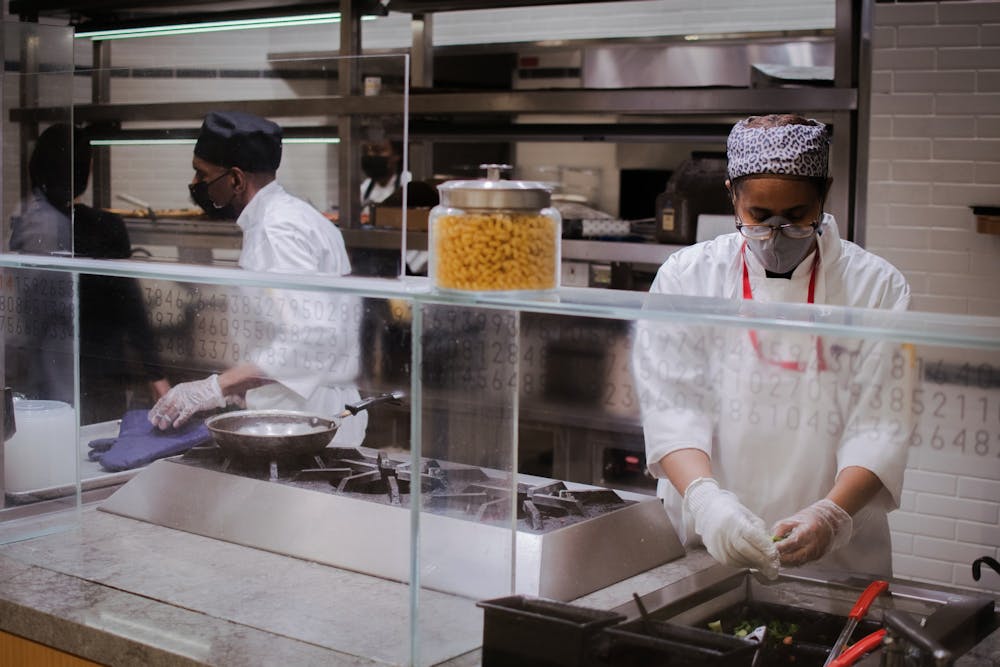
This semester, more than 3,000 undergraduates returned to campus for the first time since March. With more students living on campus, the University has reopened many dining locations that had been closed in the absence of students, bringing back the over 100 workers it furloughed in the fall. While the increase in campus population has come with increased precautions surrounding the spread of COVID-19 — twice-a-week testing for undergraduates and at least weekly testing for faculty, graduate students, and staff — until recently, subcontracted dining workers have been unable to get tested on Penn’s campus. And it took public outcry and a petition with over 600 signatures to get to that point.
Penn’s dining workers, including those subcontracted by Bon Appétit Management Company, feed and nourish our community. It should not have to take public pressure for Penn to do the right thing by offering tests to their subcontracted workers.
Bon Appétit workers are putting their health and the health of their families on the line to feed us. Penn has an obligation to test all workers who work on its campus, for the safety of the people they rely on and for the safety of the larger community. Using workers’ subcontracted status as an excuse for not testing them from the very first week they returned to campus is an inexcusable attempt to defer accountability to the very workers who make this campus run.
When workers are safer, we are all safer. So by not testing all members of the community, Penn puts everyone at greater risk. Although Penn’s baseline mitigation strategy for reducing the spread of COVID-19 states that “members of the University community participate in screening testing throughout the semester,” this has not been true. Subcontracted workers perform the same jobs as dining workers employed by Penn, interacting with each other and students in what can be close proximity.
Although Bon Appétit provided testing for workers in response to a confirmed test at Falk Dining Commons in Steinhardt Hall, reactive testing is not enough. Screening tests allows positive cases to be identified before individuals become symptomatic, reducing the chances of spread in the workplace — and to the larger population. Penn chose to bring students back to campus, so they must take every measure possible to ensure the safety of the students, the workers who interact with them, and the broader Philadelphia community. Further, when Penn has testing facilities steps away from Houston Market and Falk Dining Commons, workers should not have to go out of their way to be tested at inconvenient locations, far from their work and homes.
The delay in testing for subcontracted workers is just another instance in a pattern of continued mistreatment. Time and time again, we have seen the University blame the logistics of subcontracting for their inaction and shift accountability to Bon Appétit. Last spring, the University initially moved to lay off subcontracted workers. Then, as now, it wasn’t until public pushback and a petition emerged that the University agreed to pay these workers through the rest of the semester. With such a repeated pattern, the University’s claim that “numerous technical and logistical steps” prevented them from testing subcontracted workers earlier seems hollow. The administration had months to prepare for the reopening of campus — this should've included accounting for the need to test all workers.
Penn would not be able to bring undergraduates back to campus if it was not for its subcontracted workers. They would not be able to cash student’s housing and dining checks if not for the labor of dining workers. Penn benefits immensely from subcontracted workers but, absent public pressure, mistreats them. It’s time for Penn to start taking its responsibility to subcontracted workers seriously — and no longer wait for public displeasure to dictate when they step up.
Editorials represent the majority view of members of The Daily Pennsylvanian, Inc. Editorial Board, which meets regularly to discuss issues relevant to Penn's campus. Participants in these meetings are not involved in the reporting of articles on related topics.
The Daily Pennsylvanian is an independent, student-run newspaper. Please consider making a donation to support the coverage that shapes the University. Your generosity ensures a future of strong journalism at Penn.
Donate



